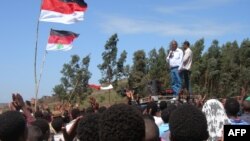Ethiopia's top opposition figure and hundreds of others were released from prison Wednesday as part of the government's recent pledge to release detained politicians and "widen the democratic space for all."
Merara Gudina led the Oromo Federalist Congress party and was arrested a year ago under the country's state of emergency after he returned from Europe, where he had briefed lawmakers on widespread and sometimes deadly anti-government protests in the East African nation.
Merara was released along with 115 others from a federal prison on the outskirts of the capital, Addis Ababa. He was met by thousands of youths in his adopted hometown of Burayu outside the capital, with some chanting anti-government slogans.
"If the government is genuine about dialogue, then we will consider it," Merara told The Associated Press.
The releases come after Prime Minster Hailemariam Desalegn's surprise announcement earlier this month that the government planned to release imprisoned politicians and close the notorious Maekelawi prison camp.
His comments came after the most serious anti-government protests since the current government came to power in 1991. The demonstrations demanding wider freedoms began in late 2015 and engulfed much of the restive Oromia and Amhara regions before spreading into other parts of the country, leading to a months-long state of emergency that has since been lifted.
Tens of thousands of people were arrested, and reportedly hundreds were killed, while one of Africa's fastest growing economies was disrupted.
Another 361 detainees were freed Wednesday from several jails across southern Ethiopia, and several hundred others elsewhere across the country are expected to be released in the coming months.
"The release of opposition politician Merara Gudina and hundreds of other detainees in Ethiopia today must only be a first step toward freedom for all prisoners of conscience in the East African country," Netsanet Belay, Amnesty International's research and advocacy director for Africa, said in a statement. "Hundreds of prisoners of conscience continue to languish in jail, accused or prosecuted for legitimate exercise of their freedom of expression or simply for standing up for human rights."
Ethiopia's government has long been accused of arresting critical journalists and opposition leaders. Rights groups and opposition groups have long called for their release, saying they were arrested on trumped-up charges and punished for their points of view.






